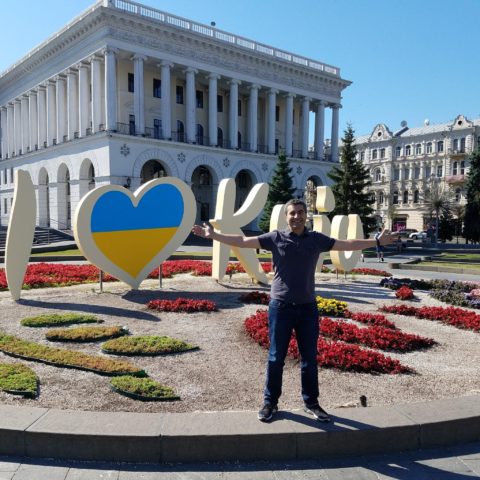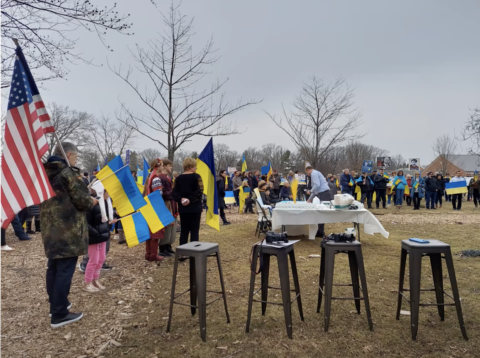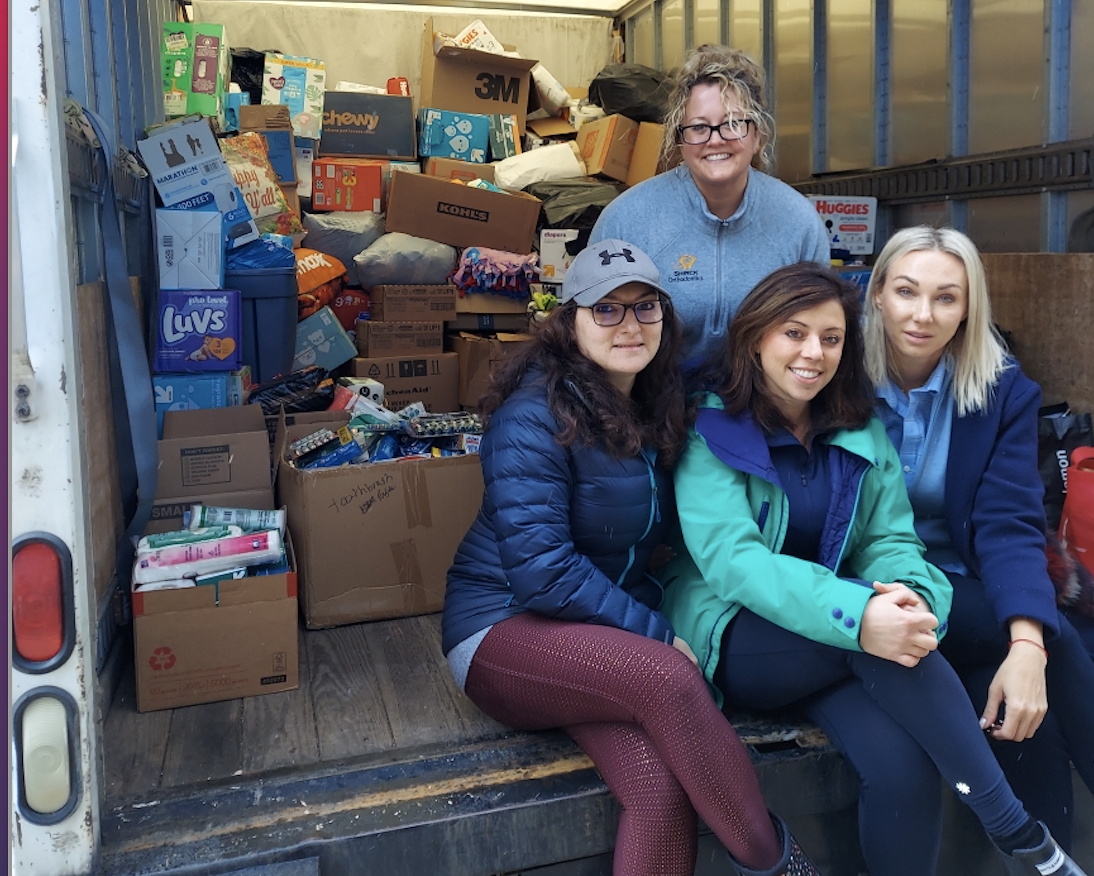24
Mar 2022
Crisis Leadership in Action: A Montage
As the war in Ukraine has waged these past few weeks, we’ve seen an abundance of news of those in our network exercising leadership in big and small ways, every day. It seems that so many in our network have mobilized to meet this moment in time and to confront the challenges of war and those it impacts.
We are grateful to be able to shed some light on just some of the examples of leadership we’re seeing in our world. By no means exhaustive, this compilation includes samples of just some of the exemplary leaders we’re proud to stand with in our communities.
Remembering the Journey of a Being a Refugee
WHP Alum Olga Serdyuk (Columbus 11)
When I heard of the horrible war, I was overwhelmed, saddened, and hurt for the Ukrainian people whose lives have flipped upside down in the matter of few days. I wanted to take urgent initiative to help people there who are under constant threat of losing their lives. Help those refugees who lost everything by fleeing from their homes. I started thinking about being a refugee here 27 years ago and how lucky we were to come here under completely different circumstances. I thought about Jews during Holocaust, and their feelings as they were forced out of their homes…. many, many emotions overwhelmed me. I refused to be idle and decided to help in any way that I can.
I started with Facebook and few messages to my friends and neighbors, and feedback was astonishing. So many people were willing to help. We were able to collect about $5,000, which I sent to a few different shelters in Ukraine, helping refugees directly. I was able to help first responders and Jewish organizations in Ukraine. Then, along with friends, I organized food, hygiene, clothes, medicine, and other donations. We partnered with local Ukrainian church and are proud to report that we were able to collect, pack, and ship 19 pallets (12 are medical supplies, others humanitarian aid) to Poland, where it will be met by volunteers and distributed to those who need it, directly to those fighting in front lines and refugees. My older son, seeing what we have done, wanted to help also. He started collecting items at school for children in Ukraine, which made me very proud to see our young generation trying to lend a helping hand, and how quickly other children at school joined in. I am extremely proud of countless people who I have to thank who made this happen.
I am a PROUD Jewish, Ukrainian-American! Seeing the horrible position the Ukrainians are in reinforces how fortunate and blessed I am to be an American. The incredible outpouring of support makes me so proud to be here am convinced we live in the best nation on earth, especially in terms of opportunity and generosity. I want to thank each and everyone who donated to our efforts in helping the Ukrainians in need. I appreciate everyone.
WHP Alum Olga Serdyuk (Columbus 11) has volunteered at Jewish Family Services, with local Holocaust survivors, and at the Wexner Heritage House.
 Bringing Blessings from Ukraine to Israel
Bringing Blessings from Ukraine to Israel
WGF/DS Alum Nir Buchler (Class 22)
On my way between Newark and Tel Aviv, I purchased Wi-Fi to read the following headlines: “Russia invades Ukraine.”
I immediately thought of my colleagues and friends from the Jewish Agency in Ukraine that I met on a mission four years ago. Are they getting out? On my social media newsfeed, I read the following from a friend of mine: “that’s it, we have enough, we are leaving Kyiv.”
I work for the Jewish Agency for Israel as a senior representative and 36 hours later, I was on our campus visiting our Global Aliyah Center. I walk into an improvised briefing where about 30 people, some are long-time professionals, some are volunteers, are getting ready to absorb thousands of daily calls to our hotline that was set up in the middle of the night.
As the largest Jewish organization in the world, Ukraine is not foreign to us. We have been working on the ground for over 30 years, building Jewish identity, running summer camps, securing Jewish communities, and of course helping those who want to make Aliyah.
As I was leaving our campus, I run into Max, a veteran professional at the Jewish Agency. He tells me that he is on his way to Warsaw and says, “They asked me to run the operations, there. We are opening hotels for the Jewish refugees as we process their Aliyah.” Elsewhere, the number we hear is that at least 15,000 will make Aliyah this year, 5 times more than in 2021.
My grandparents are Holocaust survivors, they met hiding in a basement in Budapest. Both of my grandparents lost their siblings because they were Jewish. My grandfather lost his father in a concentration camp. In 1998, I interviewed them as part of a school project. I asked my grandfather: “why didn’t you get out?” I learned there was no way out, no money, no connections, no state open to welcome them. As our group of leaders met with Natan Sharansky, we were reminded that once being Jewish was a liability, today it’s the opposite.
Today, if you are a Jewish refugee from Ukraine, there is one country that will welcome you with open arms, provide you with shelter and a safe haven. There is no need to beg any government to make this happen, we have a Jewish state that we should never take for granted. I am proud to be part of the organization that makes this miracle possible every day. Every plane that lands at Ben Gurion is a blessing that we as a collective make possible.
WGF/DS Alum Nir Buchler (Class 22) is a Vice President with the Jewish Agency of Israel.
 Mobilizing the Wexner Network
Mobilizing the Wexner Network
WHP Alum Elana Shneyer (NY 16)
“And who knows, perhaps you have attained to royal position for just such a crisis.” Esther 4:14
This question/suggestion from Mordechai to Esther has resonated throughout the four zoom calls of Wexner Alums gathering to explore what we can do to respond to the crisis in Ukraine.
We’ve been gathering weekly to explore different modes of response and testing the question of what could this network do individually and collectively at a moment of crisis such as this.
The Wexner Heritage Program ran two adjacent cohorts in New York in 2016. One cohort was made up of Russian (and Ukrainian) Speaking Jews and the other a mix of more mainstream, majority, Ashekanzi Jews. Our groups periodically learned together outside of the week-long institutes.
One enduring coming together has been our shared Whatsapp Chat. Forty of us engage in information sharing, silly memes, and lots of political and at-times charged banter. In the early days of the invasion of Ukraine, the discussion was intense with discussions about why the U.S. was not doing more as a sovereign Democratic country was invaded and its citizens cut off from vital life supplies and indiscriminately killed. There were people in our group with family and friends in Ukraine. There was also a sense of overwhelm and powerlessness, what can we do to stop this?
A few of us heard both a cry for help and a sense of powerlessness. We coordinated a call to talk about what to do and decided to hold a zoom call for our two groups and opened it up to others in the Wexner network.
That first call had nearly 50 attendees. We opened the call with a powerful dvar from Rabbinic Student Andrew Mandel (NY 16). We heard Michael Gorn (RSJ 16) and Zhenya Lopatnick who have family in Ukraine, their sense of what was happening and opportunities to provide direct aid to those fighting on the front lines and those in need of humanitarian assistance. We heard from Kerry Newman (NY 16) from UJA who expertly summarized the current Jewish communal response. Finally, we discussed opportunities for advocating to our government to do more. I explained how our elected representatives view constituent feedback and provided contact information and sample scripts for those who wanted to call. We also created a resource document of actions people can take from direct service, to philanthropy to advocacy to psycho-social and spiritual support.
In the intervening meetings we put out an action alert to support the Ukraine Aid package, which swiftly passed Congress. We also amplified the call of Don Abramson (SF 2) and Joe Kanfer for a communal fast to draw attention to the crisis in Ukraine.
We’ve heard dvars from Rabbi Joanna Samuels (WGF/DS 10) of the Marlene Meyerson JCC of Manhattan , David Lowenfeld (WHP NY 3), and Rabbi Steven Exler (WGF/DS 17).
We’ve been brought back to the urgency of the moment through personal accounts of the crisis from Stella Binkevich (RSJ 16) and Yelena Kutikova (WHP RSJ 16).
We’ve learned about responses in the field from Danny Kahn, Chair of Natan, Karyn Gershon (WHP Chicago Pro-99), Executive Director, Project Kesher, Rabbi Ben Berger (WFF 5), Vice President for Jewish Education and Experience, Hillel International and Magda Dorosz, Executive Director, Hillel Warsaw, and Sergei Demchuk & Nataliia Tkachenko, co-founders of Sokyra Charity, an organization bringing top equipment to the front line and others.
We’ve explored the U.S. Government Response with Daniel Silverberg (spouse of a Wexner alum), Former Foreign Policy Staff Member for Congressman Steny Hoyer (MD-05) and a current staffer for Chairman Gregory Meeks of the House Foreign Relations Committee.
We’ve received feedback that these have been the most informative and moving calls people have participated in on this topic, very much in the tradition of what we received as participants in the Wexner program.
As we approach the one-month mark of this conflict, with ongoing violence and increasing destruction and humanitarian impacts, the question still remains: what can we do and what can this network do?
We invite you to join us in exploring what opportunities exist for this network to come together and harness our power to change the end of an all-too-familiar story. The next call is Wednesday, March 30th at 12 pm EST. You can RSVP here. Gratitude to those who have been involved in the planning and facilitation of these calls:
Stella Binkevich (RSJ 16), Misha Gorn (RSJ 16), Alex Yaroslavsky (RSJ 16), Emily Gindi (NY 16), and Bruce Goldberger (NY 16), and Kerry Newman (NY 16).
May the one who makes peace bring peace down and may we do our part to hasten that time.
WHP Alum Elana Shneyer (NY 16) currently works an independent consultancy focused on government and community relations, politics, and not-for-profit organizational strategy, growth, capacity building, and performance management enhancement.
Dispatches from the Border
WGF/DS Alum Rabbi Steven Exler (Class 17) recently traveled to Poland along with 20-other New York-based rabbis. Read his thoughtful dispatches to his community here.
Providing Life-Saving Care from the border
WIF Alum Eynat Schlein (Class 11)
As the war began, the Israeli foreign ministry reacted immediately and launched a humanitarian assistance campaign through MASHAV, Israel’s agency for international development cooperation. Israel delivered vast cargo of many thousands of blankets, sleeping bags, coats, winter tents, 10 units of water purification systems (for 200,000 people) and huge storage and supply water systems, many tons of medicine and medical equipment.
We sent Lviv’s region 6 giant generators (5.5 tons each) to keep hospitals functioning under fire. We sent our staff from five countries around Ukraine (Hungary, Slovakia, Poland, Moldova, and Romania), to the borders, inside and out side Ukraine, to distribute huge amounts of fleece blankets, hats, gloves, thermal packs, and so on, to the tens of thousands waiting in line to cross out. This week, we opened a field hospital in Ukraine, 10 miles east of the Polish border. It is the only foreign field hospital in Ukraine. There are more than 60 doctors and nurses there, working around the clock, in wards such as cardiology, surgery, pediatric department, and even a maternity ward. More than 300 people were treated during the first two days. As heartbreaking as the situation is – and I have seen some scary sights on the Ukranian side of the border – long lines, thousands standing in the bitter cold, waiting for many hours – it is heartwarming to see the devotion of my colleagues, delivering assistance in the borders.
WIF Alum Eynat Schlein (Class 11) is Head of MASHAV, Deputy Director General, Ministry of Foreign Affairs.

